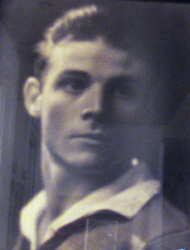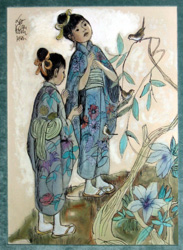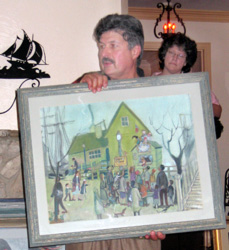See: MEDIA, Journalists, Pier Maria Pasinetti
 Portrait of a young Leo Politi |
Leo Politi: Artist, author, and book illustrator. "Politi began publishing childrenís books on local themes in 1938. In 1949 The Mission Bell, an illustrated work about San Juan Mission, won the coveted Caldecott Medal for childrenís literature. Politi lived on Bunker Hill for over 30 years. In the 1950s and 1960s, when the Community Redevelopment Agency slated that neighborhood for total destruction and urban renewal, Politi painted the Victorian buildings as they might have appeared half a century earlier, publishing the illustrations in Bunker Hill, Los Angeles (1964). He also issued a collection of watercolors depicting the early parks of Los Angeles, and painted a mural on the Biscailuz Building in El Pueblo Park in the 1970s." (From: Leonard Pitt and Dale Pitt, Los Angeles A to Z: An encyclopedia of the city and county, University of California Press, Berkeley and Los Angeles, 1997.) Politi was born in Fresno in 1908 and died in 1996. A year-long series of events to commemorate the 2008 Leo Politi Centennial can be found at: http://www.leopoliti.com.
See Ann Stalcup, Leo Politi: Artist of the Angels, Silver Moon Press, 2004.
 Book illustration by Politi |
 Book illustration by Politi |
Works written and illustrated by Leo Politi:
AngeLeno Heights Los Angeles: Leo Politi, 1989.
A Boat for Peppe, New York: Scribner, 1950.
Bunker Hill, Los Angeles: reminiscences of bygone days, Palm Desert, Calif.: Desert-Southwest, 1964.
 Paul Politi, son of Leo Politi, with the Friends of Leo Politi, sharing artwork and stories, 2005 |
Emmet, New York: Scribnerís, 1971.
Juanita, New York: Scribner, 1948.
Lito and the clown, New York: Scribner, 1964.
Little Leo. New York: Scribner, 1951.
Little Pancho, New York: The Viking press, 1938.
Mieko, San Carlos, Calif.: Golden Gate Junior Books, 1969.
The Mission Bell, New York: Scribner, 1953.
Moy Moy, New York: Scribner, 1960.
Mr. Fongís Toy Shop, New York: Scribner, c1978
The Nicest Gift, New York: Scribner, [1973]
Pedro, the Angel of Olvera Street, New York: C. Scribnerís sons, 1946.
Piccoloís Prank, New York: Scribner, 1965.
The Poinsettia, Palm Desert, Calif.: Best-West Publications, 1967.
Redlands Impressions, Redlands, Calif. (300 E. State St., Redlands 92373): Moore Historical Foundation, c1983.
Rosa, New York: C. Scribnerís, c1963
Saint Francis and the Animals, New York: Scribner, 1959.
Song of the Swallows, New York: Atheneum Books for Young Readers, 1948.
Tales of the Los Angeles Parks, Palm Desert, Calif.: Best-West Publications, 1966.
Three Stalks of Corn, New York: Scribner, 1976.
Young Giotto, Boston: Horn Book, 1947.
Of related interest:
Around the World, Around our Town: Recipes from San Pedro, edited by Dolores S. Lisica; illustrated by Leo Politi. San Pedro, Calif.: Friends of the San Pedro Library, 1986.
A Bit of History: John Fante. "Los Angeles, give me some of you! Los Angeles, come to me the way I came to you, my feet over your streets, you pretty town I loved you so much, you sad flower in the sand, you pretty town." So intones Arturo Bandini, the hero of John Fante's "Ask the Dust." Holed up in his cheap room, subsisting on oranges and stubborn determination, he is the quintessential starving artist, his base not a romantic garret in Paris, or even a drafty loft in Manhattan, but a rooming house on Bunker Hill, Los Angeles. He has come, like his creator, from a poor Italian family in Colorado, left his religion and his family to become that great thing, a writer. Arturo's success seems both imminent and highly unlikely. But succeed he does.
"Fante's inauspicious beginnings are mirrored by those of his protagonist, Bandini. His father was an immigrant Italian stonemason; his mother Italian American and frustratingly pious. Born in Denver, he survived a childhood shaped by poverty and prejudice, as well as by the sorry clash between his mother's meekness and his father's drinking, brawling, gambling and macho posturing. Fante was educated in the local Catholic primary school and a Jesuit secondary school; he considered a career in the priesthood until he began to question Catholic teachings. Thereafter his relationship with his family religion grew more complex and antagonistic.
In 1929, Fante left Colorado for Los Angeles, striking out on his own soon after his father left the family for another woman. Though Fante later claimed that "[p]overty drove me out to California," [Stephen] Cooper asserts that "[h]e was going to become a writer." He settled in Wilmington and a job in the fish canneries. He began writing between shifts, and his experiences working in the canneries and the docks, the hard men, the racial divides, all found their way into his exquisite fiction. It was, however, his family, alternately cast as the Bandinis, the Toscanas, the Molises, that preoccupied the majority of Fante's work." Excerpt from: Book review by Phyllis Richardson of Dreams From Bunker Hill; Full of Life: A Biography of John Fante (by Stephen Cooper); North Point Press. Full review by Phyllis Richardson in: Los Angeles Times, Apr 16, 2000, p. 20. A conference on the writer: John Fante: The First Conference, was held from at California State University, Long Beach, May 4-6, 1995.
John Fanteís Works:
1933 Was a Bad Year, Santa Barbara: Black Sparrow Press, 1985
Ask the Dust, New York: Stackpole Sons, 1939.
The Big Hunger: Stories, 1932-1959, edited by Stephen Cooper, Santa Rosa, CA: Black Sparrow Press, 2000.
Bravo, Burro! by John Fante and Rudolph Borchert; illustrated by Marilyn Hirsh. New York: Hawthorn Books,[1970]
The Brotherhood of the Grape, Boston: Houghton Mifflin, 1977.
Dago Red, illustrated by Valenti Angelo, New York: The Viking press, 1940.
Dreams from Bunker Hill, Santa Barbara: Black Sparrow Press,c1982
John Fante & H.L. Mencken: a personal correspondence, 1930-1952, edited by Michael Moreau; consulting editor, Joyce Fante, Santa Rosa: Black Sparrow Press, 1989.
Full of Life, Boston: Little, Brown, 1952.
The Road to Los Angeles, Santa Barbara: Black Sparrow Press, 1985.
Wait Until Spring, Bandini, New York: Stackpole Sons, 1938.
West of Rome: Two Novellas, Santa Barbara: Black Sparrow Press, 1986.
The Wine of Youth: Selected Stories, New York: Ecco, 2002.
Other Southern California writers: Lawrence Madalena, Jo Pagano.
Contemporary Italian Writers in Los Angeles
Luigi Ballerini: See: EDUCATION, University Italian Studies, Graduate UCLA
Luigi Ballerini is an Italian poet, translator, anthologist, and UCLA professor of Italian. Among his poetry publications are: Che figurato muore, 1988; Che oror líorient, 1991; Uno monta la luna, 2001; La parte allegra del pesce, 1984; La torre dei filosofi, with Remo Bodei, 1989: Further details at:
http://www.italian.ucla.edu/faculty/Ballerini_L/index.html
![]()
From the IOHI Archives: "A Story of the New Italian Immigrant: Luigi Ballerini," by Alessia Nanni Weisberg, UCLA student project, 2001, [Includes: 1) 15-page typescript, release form; 2) 2 - 90-min. audio cassettes]
Paul Vangelisti: See Translation, below
"Italian Writers of Southern California"
Among the writers in this informal group are: Ken Scambray, Mari Bucci Bush, Pasquale Verdicchio, Dan Fante, Barbara Seranella
Mary Bucci Bush
Department of English
California State University, Los Angeles
Engineering and Technology A604
Tel: (323) 343-4140
mbush@calstatela.edu
http://www.calstatela.edu/univ/ppa/mguide/english.htm
Mary Bucci Bush teaches English and Creative Writing. Her book of short stories, A Place of Light (Morrow 1990) was recently reprinted by Guernica. Chapters from a forthcoming novel Sweet Hope, about Italians illegally imported to the Mississippi Delta at the turn of the century to work on cotton plantations alongside African Americans, have appeared in several literary journals and anthologies including Growing Up Ethnic in America (Penguin 1999), the 1999 edition of From the Margin: Writings in Italian Americana (Purdue Univ. Press), and The Voices We Carry (Guernica 1994). Her short stories have appeared in various literary journals including The Missouri Review, Ploughshares, VIA, and Story.
Kenneth Scambray
Dept. of English
University of La Verne
1950 Third Street, La Verne, CA 91750
Tel: (909) 593-3511
Fax: (909) 596-1451
scambrayk@verizon.net
http://www.ulv.edu/english/page3.phtml
Ken Scambray teaches American literature, North American Italian literature and Los Angeles fiction. Publications include: A Varied Harvest: The Life and Works of Henry Blake Fuller (U Pittsburgh P, 1987), The North American Italian Renaissance: Italian Writing in America and Canada (Guernica Editions, 2000), and Surface Roots: Stories (Guernica Editions, 2004), Queen Calafia's Paradise: California and the Italian American Novel,(Fairleigh Dickinson University Press, 2006). His poetry and fiction have been anthologized in a collection of Sicilian American writers, Sweet Lemons (2004). Since 1978, Scambray has been the book and film critic for I'Italo-Americano, where he has published over 250 reviews on Italian and Italian-American film and literature.
Pasquale Verdicchio
Literature Dept.
University of California San Diego
9500 Gilman Drive, Literature Department 0410
La Jolla, California 92093-0410
Tel: (858) 534-5794
http://literature.ucsd.edu/faculty/pverdicchio.cfm
Italian-Canadian poet, translator, UCSD professor of Italian and Comparative Literature: Modern Literature, Poetics, Italian Cinema, Cultural Studies, Environmental Movements and Literatures. Among his publications of poetry: Nomadic Trajectory (poems), Montreal: Guernica Editions, 1990; The Posthumous Poet: A Suite for Pier Paolo Pasolini (poetry), Los Angeles: Jahbone Editions, 1993; Approaches to Absence (poetry), Montreal: Guernica Editions, 1994; Devils in Paradise: Writings on Post-emigrant Cultures, Toronto: Guernica, 1997; Bound by Distance: Rethinking Nationalism Through the Italian Diaspora, Madison: Fairleigh Dickinson University Press, 1997, and This Nothingís Place, Toronto: Guernica, 2007.
A Bit of History. Tony Scibella, bongo-playing Beat poet lived in Venice and died in 2004. See: ARCHITECTURE, Points of Special Interest, Venice.
Literary translations: Italian to English
Paul Vangelisti
Otis College of Art and Design
9045 Lincoln Boulevard
Los Angeles, CA 90045
Tel: (800) 527-6847 (310) 665-6800
Fax: (310) 665-6821
pvangel@otis.edu
http://www.otis.edu/academics/mfa_writing/gw_faculty.html
Translator, journalist, and former cultural affairs director at KPFK radio. Paul Vangelisti is the author of some twenty books of poetry, as well as being a noted translator of contemporary Italian poetry. From 1971-1982 he was co-editor of the literary magazine Invisible City and, from 1993-2002, the editor of the visual and literary arts annual, Ribot: the annual publication of the College of Neglected Science. He is currently the chair of the Graduate Writing Program at Otis College of Art & Design.
Murtha Baca: MBaca@getty.edu
Murtha Baca is head of the Getty Vocabulary Program, Standards, and Digital Resource Management and has produced many and varied translations (e.g., P.M. Pasinetti's novels, Pellegrino Artusi)
Literary Traltation: English to Italian
Luigi Ballerini: see Contemporary Writers
Of related interest:
Professors of Italian Literature: University departments of Italian normally teach courses in Italian language and literature, sometimes culture and cinema (See: PERFORMING ARTS, Film & Theater), and more rarely linguistics. See: EDUCATION, University Italian Studies, UCLA, Edward Tuttle.
Professors of Italian American Studies: See: EDUCATION, University Italian Studies, University, California State University, Long Beach, Teresa Fiore; See above: Scambray, Verdicchio.
Italian American Writers (contemporary Italian American writing): http://www.italianamericanwriters.com/Bordighera.html
Association of Italian Canadian Writers: http://www.aicw.ca/membership3.htm
Italian American Writersí Association: http://www.iawa.net/get.php?q=index
